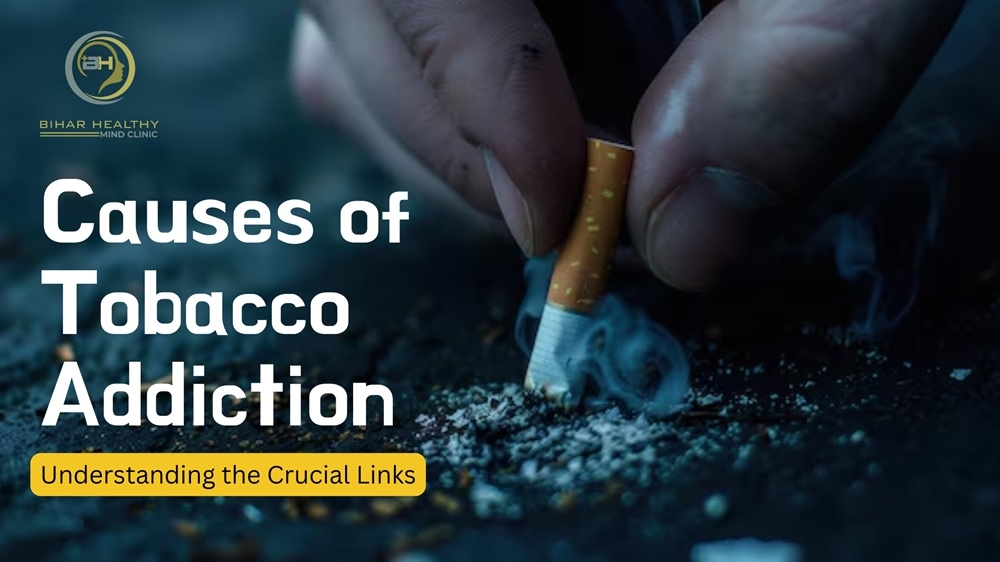
Tobacco addiction continues to be one of the most pressing public health concerns worldwide. Despite extensive awareness campaigns about the dangers of smoking and chewing tobacco, millions struggle to quit. At Patna Psychiatry, Dr. Saurabh Kumar, MD (Psychiatry), recognized as the best psychiatrist in Patna, has worked extensively with individuals facing the complexities of substance use and dependence. To address this concern, it is important to understand the causes of tobacco addiction, which range from biological to social factors.
This blog explores the deeper connections behind why people become addicted to tobacco and why breaking free from its grip requires both medical and psychological support.
The Biological Foundations of Tobacco Addiction
One of the primary causes of tobacco addiction lies in the chemical makeup of tobacco itself. Nicotine, the active compound, stimulates the release of neurotransmitters like dopamine. This surge of dopamine creates a pleasurable sensation that reinforces the act of smoking or chewing tobacco. Over time, the brain adapts to this cycle, reducing its natural production of dopamine and demanding more nicotine to feel the same level of satisfaction.
This process, known as neuroadaptation, explains why quitting tobacco is difficult. Even when individuals are fully aware of its harmful consequences, the biological changes within the brain keep pulling them back toward the substance.
Psychological Triggers and Emotional Factors
Beyond biology, psychological influences play a significant role in the development of addiction. Many individuals turn to tobacco as a coping mechanism for stress, anxiety, or depression. The temporary calming effect of nicotine creates an illusion of relief, making it easy to associate smoking with comfort.
This emotional dependency gradually becomes one of the causes of tobacco addiction, as individuals start relying on tobacco whenever they face challenging emotions. Unfortunately, this cycle deepens the psychological attachment, making it more than just a physical dependency.
Social and Environmental Influences
Social environment is another powerful factor behind tobacco use. Peer pressure, family habits, and cultural acceptance all shape a person’s relationship with tobacco. Teenagers are especially vulnerable, as the desire to fit in often outweighs health concerns.
Workplaces and social gatherings can also reinforce tobacco use. If tobacco consumption is normalized in an environment, resisting the urge becomes even more challenging. Thus, social reinforcement emerges as a major cause of tobacco addiction, particularly in the early stages of use.
Genetic Predisposition and Family History
Scientific research indicates that genetics also play a part in tobacco dependence. Some individuals may be biologically more sensitive to nicotine, increasing their likelihood of developing addiction after minimal exposure. Similarly, having a family history of substance dependence raises the risk, as children often mirror behaviors observed in parents or siblings.
This genetic vulnerability, combined with environmental triggers, amplifies the difficulty of quitting, making professional intervention essential.
The Role of Stress and Modern Lifestyle
The fast-paced modern lifestyle, characterized by constant deadlines, performance pressures, and uncertainty, has made tobacco use a common escape route. Stress is one of the most cited causes of tobacco addiction, as nicotine offers momentary relief from mental strain. Unfortunately, the relief is short-lived, leading individuals to consume tobacco more frequently, eventually causing long-term harm to both physical and mental health.
Consequences of Tobacco Addiction
While discussing the causes of tobacco addiction, it is also important to highlight its consequences. Prolonged tobacco use damages nearly every organ in the body. It significantly increases the risk of heart disease, lung cancer, chronic obstructive pulmonary disease (COPD), and stroke.
From a mental health perspective, tobacco dependence can worsen anxiety, heighten irritability, and contribute to mood disorders. Many individuals also experience guilt and low self-esteem due to their inability to quit, further complicating recovery efforts.
Breaking the Cycle: Why Professional Help Matters
Overcoming tobacco addiction is not just about willpower. Since the causes are deeply rooted in biology, psychology, and environment, professional care becomes crucial. At Patna Psychiatry, comprehensive treatment plans are developed by Dr. Saurabh Kumar, widely regarded as the best psychiatrist in Patna.
-
Treatment often includes:
- Behavioral Therapy: Helping individuals identify triggers and build healthier coping strategies.
- Medication Support: Using evidence-based medications to manage withdrawal symptoms and reduce cravings.
- Lifestyle Counseling: Encouraging stress-management techniques such as mindfulness, exercise, and relaxation practices.
- Support Systems: Involving family members and support groups to strengthen recovery.
This holistic approach ensures that patients are not just addressing the habit but also the underlying psychological and social factors.
Final Thoughts
Understanding the causes of tobacco addiction is the first step toward breaking free from it. Addiction is not a sign of weakness but a result of interconnected biological, psychological, and social factors. While tobacco creates one of the most challenging forms of dependence, recovery is possible with structured guidance and professional treatment.
If you or a loved one is struggling with tobacco dependence, seeking timely help can make all the difference. At Patna Psychiatry, Dr. Saurabh Kumar, MD (Psychiatry), provides compassionate and effective care to guide patients toward lasting recovery. With the expertise of the best psychiatrist in Patna, individuals can reclaim their health and embrace a tobacco-free life.
Visitors: 69





No comments yet.